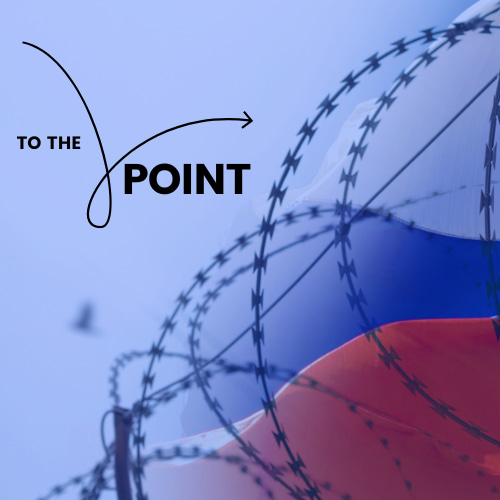To the Point: What Are the Implications of Trump’s Shocking NATO Comments?
 To the Point provides insights from AU faculty experts on timely questions covering current events, politics, business, culture, science, health, sports, and more. Each week we ask one professor just one critical question about what’s on our minds.
To the Point provides insights from AU faculty experts on timely questions covering current events, politics, business, culture, science, health, sports, and more. Each week we ask one professor just one critical question about what’s on our minds.
On Saturday at a South Carolina political rally, former President Donald Trump said he would allow Russia to “do whatever the hell they want” if it attacked a NATO (North Atlantic Treaty Organization) country that didn’t pay enough for defense.
"You don't pay your bills, you get no protection. It's very simple," Trump said. "Hundreds of billions of dollars came into NATO, and that's why they have money."
His comments drew fierce backlash from the White House and leading officials across NATO. “Encouraging invasions of our closest allies by murderous regimes is appalling and unhinged — and it endangers American national security, global stability and our economy at home,” said White House spokesperson Andrew Bates in a statement on Saturday night.
Most American have always taken for granted NATO’s historic 75-year alliance to safeguard the freedom and security of all its members. So, how serious are Trump’s threats, and what are the possible foreign policy implications for the United States and other NATO members? We turned to Allan J. Lichtman and asked him to share some historical perspective and weigh in on the possible world-wide consequences. Lichtman is an American University Distinguished Professor of History and the author of 11 books including The Case for Impeachment (Dey Street Books, 2017). He appears on Lichtman Live every Thursday at 7 p.m. EST at @allanlichtmanyoutube.
What are the political implications of Trump threatening to shatter NATO and the West’s collective security?
For 75 years, the NATO alliance has protected western nations from foreign attack. At the heart of the NATO treaty is collective security. With the agreement of its members, NATO nations pledge to come to the defense of any member nation attacked by a foreign country. Now, in remarks made at the South Carolina campaign rally, Donald Trump threatened to shatter collective security if elected again as president.
Trump recalled a NATO summit he attended as president. Trump said, “One of the presidents of a big country stood up and said, ‘Well, sir, if we don’t pay and we’re attacked by Russia, will you protect us?’ I said, “You didn’t pay, you’re delinquent?” He said, ‘Yes, let’s say that happened.’ No, I would not protect you.” Never mind that NATO is not a dues-paying alliance, and no so-called delinquent members exist. Worse yet, Trump has encouraged Russian dictator Vladimir Putin to invade any supposedly delinquent NATO member. Trump said, “In fact, I would encourage them [obviously the Russians] to do whatever the hell they want.”
Trump’s unilateral approach to the world harkens back to “America First” conservatives who sought to appease two other bloody dictators: Adolph Hitler and Joseph Stalin. After the outbreak of World War II, Senator Robert A. Taft opposed American aid to the allies resisting Nazi aggression. Taft saw not “the slightest reason” to believe that a German victory over Britain would stop America from remaining “a great and prosperous democracy.” Taft voted against Lend Lease aid to the allies. Without Lend Lease, Hitler would surely have conquered the Soviet Union and killed the several million Jews who resided there.
In 1949, Taft voted against the treaty establishing NATO. “As set up, it is a step backward. NATO is “a military alliance of the old type where we have to come to each others’ assistance no matter who is to blame.” In 1952, retired General Dwight D. Eisenhower decided to run against Taft for the Republican presidential nomination. Eisenhower believed Taft’s opposition to collective security would lead to Communist domination or World War III. Republican Senator Henry Cabot Lodge of Massachusetts, who became Ike’s campaign manager, warned that Taft’s foreign policies “could lead to national suicide.” An Eisenhower campaign memo, “Demolish the Enemy,” noted, “If Taft had been president, we wouldn’t have to worry about bringing Gen. Eisenhower back from Europe—Europe would have fallen long ago to the Communists.”
Trump’s opposition to collective security, like that of Taft, has dire consequences for the fate of democratic nations. Putin, who dreams of recreating the Soviet Empire, would not hesitate to attack member nations if he did not fear the consequences, with Poland as a possible target. In his interview with former Fox News anchor Tucker Carlson, Putin defended Hitler’s invasion of Poland, which began the World War and resulted in as many as 70 million deaths, including approximately 38 million civilians.
About Professor Allan J. Lichtman

Professor Lichtman received his PhD from Harvard University in 1973 with a specialty in modern American history and quantitative methods. He became an Assistant Professor of History at American University in 1973 and a Full Professor in 1980, and a Distinguished Professor in 2011. He received the Scholar/Teacher of the year award for 1992-93. He has published 11 books and several hundred popular and scholarly articles. He has lectured in the US and internationally and provided commentary for major US and foreign networks and leading newspapers and magazines across the world. He has been an expert witness in some 100 civil and voting rights cases. His book, White Protestant Nation: The Rise of the American Conservative Movement was a finalist for the National Book Critics Circle Award in nonfiction. His co-authored book with Richard Breitman, FDR and the Jews, won the National Jewish Book Award Prize in American Jewish History and was a finalist for the Los Angeles Times book prize in history. His book, The Case for Impeachment, was a national independent bookstore bestseller. Lichtman's prediction system, the Keys to the White House, has correctly predicted the outcomes of all US presidential elections since 1984. He was listed by rise.global as # 85 among 100 most influential geopolitical experts in the world and received the lifetime achievement award from Who's Who.
The opinions expressed in this interview are the author's own and do not necessarily reflect those of American University.
